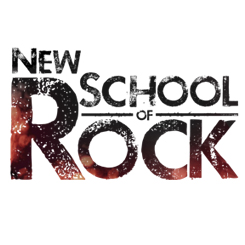CHRIS BRODERICK - ACT OF DEFIANCE “Birth and the Burial” Interview
- Details
- Category: Interviews
- Published on Saturday, 05 September 2015 21:33
- Written by Richman/Fjodor
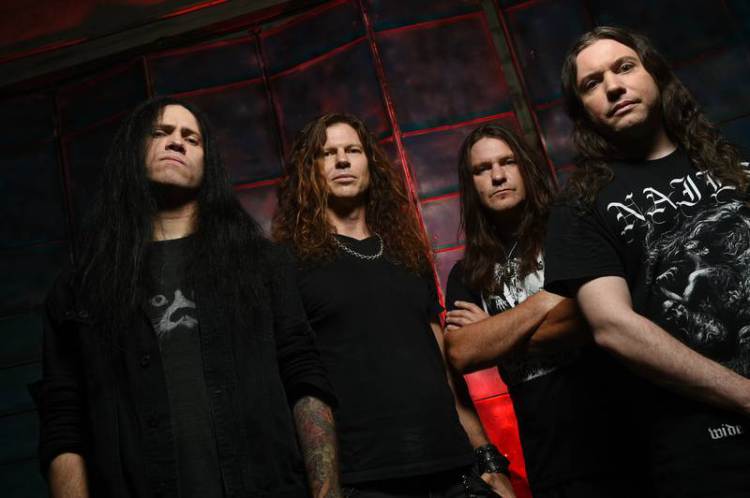
Sharp riffs, catchy hooks, and terrific solos: CHRIS BRODERICK has just released the debut album of his new band ACT OF DEFIANCE. After seven successful years with MEGADETH, he decided to follow his own path, and join forces with his former bandmate Shawn Drover. Entitled “Birth and the Burial”, ACT OF DEFIANCE's debut album is a headbanging Thrash Metal attack featuring ten cleverly arranged Thrash and American Metal songs. We spoke with Chris about the recording of the new album, the difference between his and Dave Mustaine’s style of playing, a new generation of shredders, and much more.
Born in 1970, guitarist CHRIS BRODERICK (pictured above, second from left) has played with prog bands like JAG PANZER and NEVERMORE. When Chris left MEGADETH in November 2014, all eyes were turned towards his new project ACT OF DEFIANCE with former MEGADETH drummer Shawn Drover, bassist Matt Bachand (SHADOWS FALL/TIMES OF GRACE) and vocalist Henry Derek (SCAR THE MARTYR).
Hi Chris, we have been looking forward to this interview for a long time. Can you please tell us about why you have chosen the band name, and what is the background to the record’s title?
We chose the band name over time. So what we did was open up an online document. Both, Shawn and I would add names to it as they kind of came to us. You know, so if I would think of a new name, I would just throw it up there and if he would, he would throw it up there as well. But we didn´t really worry about the name that much at first, until things started coming down to the wire, where we actually had to choose the name. And the one we both liked was the name “Defiance”, but “Defiance” was already taken by about a million other bands, so we started thinking about phrases that would go in front of “Defiance” and sound really cool, and we really liked “Act of Defiance”. It kind of represents either rebellion or something for a noble cause. You know, being defiant to make change for the better; and that´s the way I kind of knew the name is having a really positive slant on it.
If I understand correctly, you wrote five songs, and Shawn (Drover) also wrote five songs?
This is correct. We started demoing songs in early December and I would say we had all of the songs written by the end of February. So I would say we wrote the songs pretty much in two months. However, we were always adding things to them and rearranging them as we were demoing them up until the point of the final recording. So you might say we wrote them in two months but we kind of edited them for a little longer than that.
Where did you record and how long did it take you to finish the album?
We recorded it in three different studios. All of the vocals, guitars, classical guitars, cellos, and piano we recorded at my studio, “iLL faded Studios” in L.A. And Shawn recorded at a studio in North Carolina with Chris Harris producing the drums; and then Matt recorded his bass parts at his own personal studio at his house in Massachusetts. It took us - until we started doing final takes - I would say until February. Shawn went in to record the drums like really early March I believe and we finished the CD by the end of April. So we recorded it over a period of two month to get the final takes.
We saw that you have been using the "Fractal Audio Axe-Fx” for the studio recording. Did you use any ordinary amps?
I did not. It was all “Axe-Fx”. I went straight into the “Axe-Fx”; and then out of the SPDIF out into my audio card. I didn´t even use a mike, just went straight into the desk.
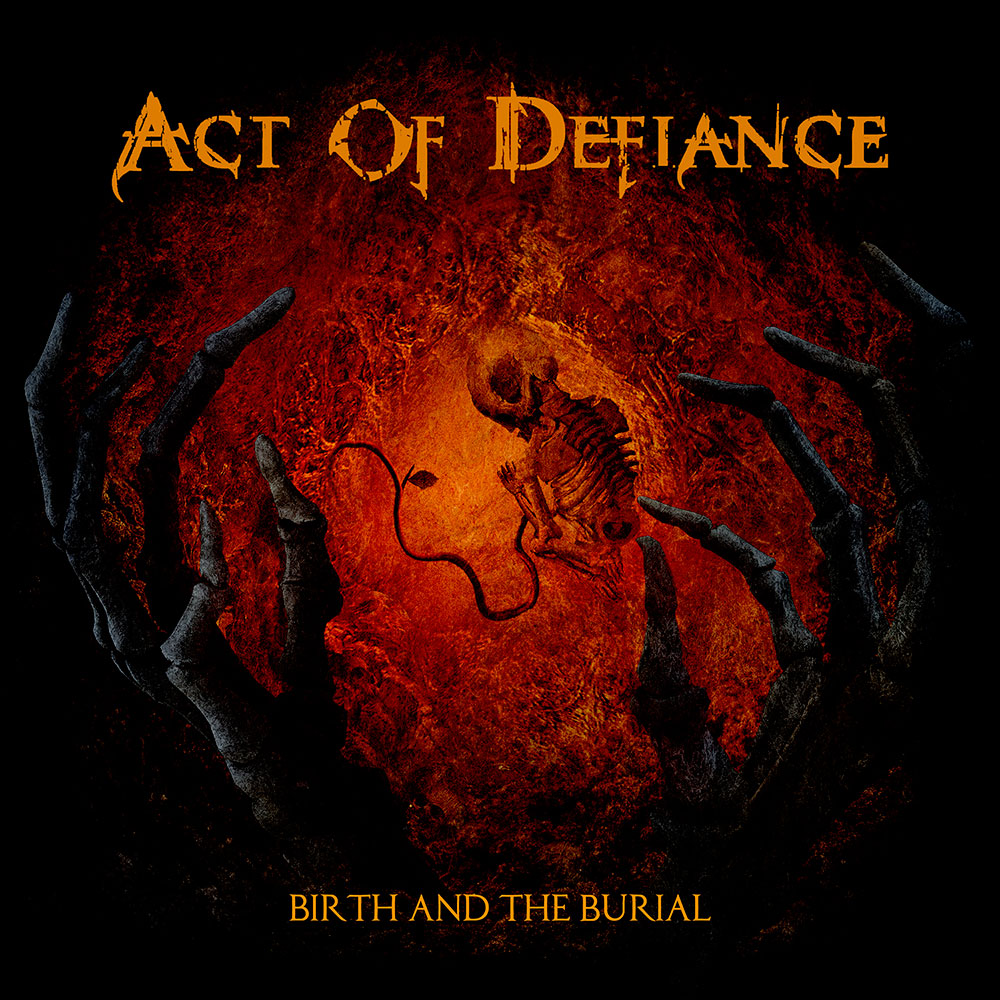
We love your sound on “Throwback” . How long did it take you to program the sounds you needed?
I actually spent a lot of time programming my sounds. I did an extensive search, for not only the amp models that I would use, but I also got a lot of Cabinet IRs and I compared a bunch of them and then ended up using a mix of like eight different Cabinet IRs for the final tone. My main rhythm tone was based on an ENGL Savage and my lead tone was based on the Friedman HBE Model in the Fractal.
Is the equipment you used in the studio also the one you will be using live?
Yes. I will be using Fractal live as well and we might even use it for bass as well. There is a chance. Matt is going to try it out and see if he likes it. And if so, we are going to use it for both, guitar and bass.
In a recent YouTube video you were trading licks with Gus G. You played some licks that reminded you of George Lynch, who also just released a new record. Would you say that George, who you also recorded a video with, was an influence on your playing/style?
I definitely would say George Lynch was an influence on me. Definitely his guitar tone, I always loved his guitar tone. And I always loved his style too and the way he plays. But I don´t know that it really embedded itself into my playing as much as I would have liked, actually. Because I love his sense of tonality and where he goes with certain notes. But I don´t know whether I picked up so much of that, of what he uses.
Who would you say are your main influences? If I remember correctly you said you like playing the music of Scotty Anderson.
SCOTTY ANDERSON is awesome. He is a great guitarist, a country guitarist and I would love to be able to play like him. But I wouldn´t say he is my main influence. So my main influences are JASON BECKER, PAUL GILBERT, PACO de LUCIA. They all have influenced me greatly. They are all phenomenal players you know. I owe them so much for my style. So those would be the main three players that influenced me growing up. Scotty Anderson was more recent but he is such a phenomenal player too.
How important has music theory been for your style of playing?
To me it´s very important because theory is not a rule or anything like that. Theory is merely noting what a harmony or a rhythm sounds like. If you can notate those things, and you can give them a sense of purpose, then you can reuse them whenever you want. I am a huge addict of theory and I think what’s really cool is when you hear something in your head you want to create and you can break it down theoretically and know exactly how to construct it on your guitar or on a piano or on whatever instrument you are playing.
If I understood correctly the Hungarian Gipsy scale is one of your favorite scales. Can you please tell us about the structure of the scale?
It is one of my favorite scales, indeed! I love it because it does have that sort of gipsy sound but it also got a bit of Middle Eastern sound to it as well. But you break it down by just playing a natural minor scale and raising the fourth scale degree and the seventh scale degree. Super cool! It tends to frame the five chord really well and that´s what I like to use it for. And I think actually how the scale was born was resolutions that lead to the fifth scale degree.
Besides the Gipsy scale, what would be your other top two scales? What would be the most musical way to practice slamming these scales?
Besides Hungarian Gipsy minor I love Harmonic minor and Melodic minor. I also like Lydian as well for more upbeat stuff. The most musical way to practice these is to learn the function of these scales, namely why they were created in the first place. Like I was talking about with the Hungarian Gipsy minor scale - it tends to want to lead to the fifth scale degree and if you look at harmonic minor it tends to want to lead to the root, to the one. Lydian to me just tends to have this more kind of a little bit lost kind of sound and I really like that. So on that particular scale I tend to like to use the none chord tones so that they kind of emphasizes some dissonance.
To what expense does playing seven string guitars impact on your style, and in which way did it expand your harmonic possibilities.
The first time I heard a seven string that I really loved was on DREAM THEATER’s “Awake”. It sounded so heavy and junky and in your face. So that´s why I initially started playing the seven string. But from there I saw that not only you can use it to extend your range lower but you can also refinger things on the fretboard. Another thing that I notice is, that, when I do my two handed tapping stuff and play, let’s say a piano song, the seventh string encompasses the range a lot better for that kind of playing.
You have a mind blowing technique. How long did you practice when you first started learning the guitar? Do you still have a practice routine and if yes, what do you focus on these days?
(Laughs) I practiced a lot when I first got the guitar! I practiced all the time from what I can remember. And then when I started to really trying get serious about it, you know, I had this regimen where I would practice two hours the piano, five hours of classical guitar, two hours of violin and five hours of the electric guitar. I am sure that it helped my technique out a lot but it was pretty hard to do sometimes, you know. It definitely made my summers a lot less exciting than I think some of the other kids that I would hang around with. I do still have a practice routine. I try to practice, if I have a day off, prime practice six hours, and I tend to focus on theoretical concepts that I am trying to develop like different harmonic movements, and then I wrap technique around that, whether it’s a tapping, bending into the notes of the new harmonic material, etc. And then a lot of my focus recently has been going over THE ACT OF DEFIANCE stuff so that I am ready when we hit the road.
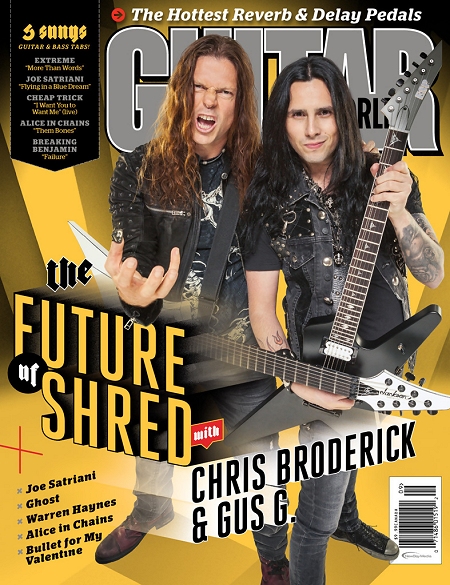
You have a degree in Classical Guitar from the University of Denver and the Lamont School of Music. We understand that your primary Instructor was Ricardo Iznaola. What was it that you remembered most from your formative years?
I would say just the very traditional sense of practicing and being in a very traditionally Classical Guitar oriented school. It´s a great school to go to for that particular style of music. And Ricardo is a phenomenal player. So I just can remember always being in the practice studio and trying to get stuff down as best as I could.
Have you seen the movie “Whiplash”? If yes, what do you think about it?
(Laughs) I have seen “Whiplash”. I do think that stuff happens to some degree. But I think that particular instructor was way out of control the way he tried to teach greatness and talent. For me, I personally like to focus on what inspires people to play as opposed to torturing them to play (laughs). So that’s what I took from it and I would never teach that way if I were in that position.
How important is a teacher for one’s artistic development?
I think a teacher is very important because you need to have questions answered. When you try to play something, even if you see other people play it, it can identify problematic areas with your own playing and your own technique and your own development. Whereas a teacher, that is watching you playing and looks at how you try to execute something can make a better assessment as to what you need to work on than yourself sometimes when you are too close to the music.
Do you yourself still teach?
Yes, I still teach. I have about 40 students each week that I teach. And I have no plans on discontinuing teaching. It’s something I enjoy doing very much. Especially when I see somebody’s eyes light up, when they get a concept that I am trying to teach and they really want to make it their own. That to me is one of the biggest forms of a compliment in a way that you can get. You are actually imparting knowledge on someone else.
We assume that your fingerpicking technique must be highly developed. Would you say that this is how you developed your tapping technique?
Yes, I would say it’s definitely helpful. However, the way that you use your right hand is totally different between making a stroke through the strings on a classical guitar and tapping down on the fretboard of an electric guitar. But I do think I gained a lot dexterity from developing my right hand with finger picking.
You also briefly elaborate on a special pick that you developed. Where can people buy it?
I call that the “Pick Clip” and people can buy it from my site just got to my website www.chrisbroderick.com. There will be links there to where you can purchase it. It was developed on the idea that I wanted to be able to play two handed taping stuff and then go back to traditional picking stuff very quickly back and forth. It started when I was doing two handed tapping. I started gluing a rubber band under my pick. But I would always wear through them when I would do pinch harmonics. So then I started trying to use thumb picks and I never liked the tip on them or the angle so I ended up cutting off the tip of thumb picks gluing them to the picks I liked. I ended up coming up with this “Pick Clip” where you use the pick that you like and you slide it into a sleeve and it holds it against your thumb at any angle, at any depth and with any amount of grip that you like.
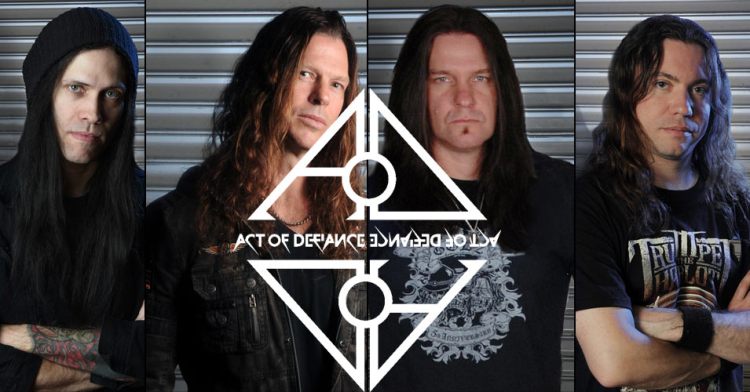
Besides all the great musicians we mentioned above, is there anyone else’s music that you like at the moment?
Yeah, definitely! I think there are a lot of great upcoming guitarists. The guitarist of ARSIS (James Malone), the guitarists for CHELSEA GRIN (Jason Richardson and Dan Jones), great guitarist JAKE DREYER (former lead guitarist for Los Angeles based Heavy Metal band WHITE WIZZARD), and the guitarist of REVOCATION (David Davidson) is also very good, and EXMORTIS (Brian Werking) as well. A lot of good guitarists coming up. They are on the younger side of things but I like that. They are leading the charge of the next wave of shredders. So that’s awesome!
We have seen interviews where you explained the reasons why you left MEGADETH. From a guitarist’s point of view - how would you say your style of playing differed from that of Dave Mustaine?
Well, I always liked the differences in our styles. If we were both fighters and I had went to school for Jiu Jitsu and Dave was a streetfighter, he totally got his playing on his own, the way he plays is the result of him just trying to make the guitar sound the way he wants it to sound. Whereas I took a much more school approach to the guitar and went through the education system, you know, got my classical guitar degree and took just myriads of lessons before and after that.
What impact did being in MEGADETH have on you career?
It had a great impact on my career! It was very good for me and I loved seeing all the fans and playing all the huge crowds and the small crowds when we played smaller shows. It was awesome! You know, I got to know a lot of the fans when I would go out and hang out with them and try to be as personal as possible. So I think it had a huge impact on my career! It had a huge impact on people knowing my name and I always appreciate that.
Have you ever thought doing an instrumental solo record?
Yes, definitely. In fact, when I was getting ready to leave MEGADETH that was my main focus: I was going to release an instrumental solo CD. But after Shawn left and then I left, between us talking, we decided to put together ACT OF DEFIANCE, and so I am holding off on releasing my instrumental CD for a little while until I get a little bit time.
If you would give one piece of advice to a young musician, what would it be?
One piece of advice is hard, but I would say, never sell yourself short. Always take every opportunity possible, always put yourself out there, so that people will see you and just let other people be the judge of your talent and stuff like that. And just keep working and keep the guitar in a fun spot.
Any chance of seeing you guys on a European stage soon?
Yes! We are definitely looking into getting over there as soon as possible. We´ve got a couple of potential tour offers on the table. But nothing is confirmed yet. So I can´t talk about them at this time but yeah, we will be over there soon!
Thank you so much. Wishing you all the best & looking forward to seeing you on European stages hopefully soon.
www.metalblade.com/actofdefiance
www.chrisbroderick.com




